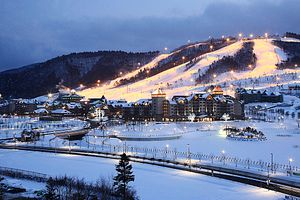The notion that the Olympics should be a respite from politics and international conflict is one rooted in history. In ancient Greece, an Olympic truce was called during the games to allow athletes from warring city-states to travel safely to the competition. In reality, politics frequently intruded, despite the best intentions of the Greeks.
Then, as now, states hosting the games sought to capitalize on the spotlight. In their modern incarnation, hosting the Olympics has often served as a coming out party of sorts. The Tokyo games of 1964 sought to present a new, pacific Japan to the world. Countries like South Korea (Seoul 1988), China (Beijing 2008), and Brazil (Rio de Janeiro 2016) have used the Olympics to mark their emergence as advanced economies taking their place on the world stage. Other venues have tried to glorify repressive autocracies – Nazi Germany in the Berlin games of 1936 and the Soviet Union in Moscow in 1980.
Boycotts, now seemingly largely a feature of the past, were called to make political points. Several dozen African nations boycotted the 1976 Montreal Olympics to protest South African apartheid (though South Africa had been banned from competition for more than a decade). Four years later, the United States led a group of more than 60 nations in a boycott of the Moscow Olympics over the Soviet invasion of Afghanistan. And in a tit-for-tat move, the Soviets and many of their allies boycotted the 1984 Los Angeles games four years later.
Sadly, international (Munich 1972) and domestic (Atlanta 1996) terrorism has marred the games.
None of this is surprising in a forum where the nation-state plays a central role, from the presence of heads of state and the parade of nations during the opening ceremony to the playing of national anthems to commemorate success. Indeed, politics has always been part of the modern Olympics.
In that vein, I would argue that the Olympics are a nearly unmatched platform to champion human rights.
Adolf Hitler tried to sell his message of racial superiority in 1936 to a global audience, but the performance of American Jesse Owens embarrassed the Nazi regime.
American runners Tommie Smith and John Carlos focused domestic and international attention on the United States’ civil rights struggle through their raised fist salute at a medal ceremony in Mexico City.
The selection of Beijing as host of the 2008 summer games brought new attention to human rights issues in the Olympic context. The Chinese government ramped up its already formidable repression, removing and silencing dissidents and other “undesirables,” restricting coverage by foreign media, and evicting thousands from their homes to construct Olympic venues. Violations of labor standards and more mass evictions marred the Rio games eight years later. Similar concerns over abusive labor practices have brought unwanted attention to the 2022 soccer World Cup in Qatar.
Responding to these and other abuses, the International Olympic Committee enacted reforms kicking in for the 2024 host city (Paris) and beyond. The new conditions set new obligations for host governments, including a ban on discrimination in any form, compliance with United Nations and other international standards on human rights, tightened rules on corruption, and support for the UN’s Sustainable Development Goals. Unfortunately, these measures go into effect after the selection of Beijing as host for the 2022 Winter Games. Still, the stepped up attention is a step in the right direction.
The PyeongChang Winter Games are being held in an area only 50 or so miles from the Demilitarized Zone and the North Korean frontier. When South Korea hosted the summer games in 1988, North Korea attempted to derail the event in a variety of unsuccessful efforts, including a boycott. This year, North Korea will participate and the South Korean government is attempting to leverage the games to ratchet down tensions with Pyongyang.
While perhaps a country’s human rights record should be a qualification for participation, there’s really only one historical example of exclusion – South Africa was banned for its Apartheid policies from 1964 until 1992.
This year, many of the countries with the worst human rights records will be at the Pyeongchang games. Ninety-five nations qualified to send athletes. Eleven of them were judged “not free” in Freedom House’s Freedom in the World study: Azerbaijan, Belarus, China, Eritrea, Iran, Kazakhstan, North Korea, Turkey, and Uzbekistan. Russia also made that list, although its athletes will compete as “independents,” due to Russia’s exclusion over doping.
In an ideal world, the Olympics would be truly above politics. But we don’t live in an ideal world and it’s therefore incumbent on the spectator to remember that many nations don’t deserve a place of honor at the games.
Lindsay Lloyd is the deputy director of the Human Freedom Initiative at the George W. Bush Institute.

































